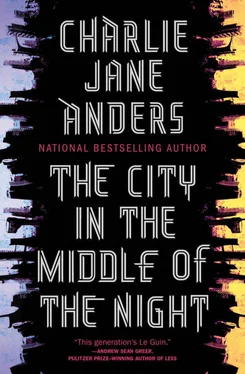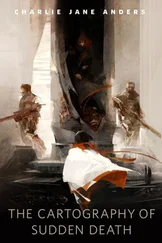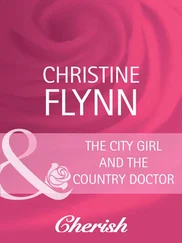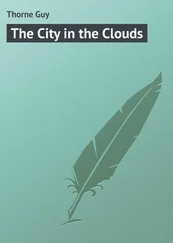A naked man fell out of a window in front of them, blood already spurting from a wound in his shoulder before he even hit the pavement. “Fuck,” he said, and died.
Mouth did not want to know what would happen if a bullet hit the crate. She was reliving the memory of hanging over the ice, babbling supplication. She tried to stay businesslike, rough-hewn. “I guess we ought to move.”
Alyssa nodded, and they got the crate in motion again.
“Potatoes,” Mouth said. “Get your fresh potatoes.”
“Shut up.”
The way forward was blocked by the large bearded man they’d met at the Perfectionist building. “You made it,” he said, and Mouth realized that ugly blob behind him must be the maiden’s fountain. “Nai is going to hear about your service, and you’re going to be—”
A hole had opened in the man’s forehead. He pitched forward, onto the pavement.
Standing behind him, gun raised, was Maria, wearing a floral dress that was probably nice before it got coated with the blood of four or five different people, going by the spray patterns. “Fucking smugglers,” she said.
“You don’t want to shoot us while we’re holding up this crate,” Alyssa said.
“We all do things we don’t want to do,” Maria said, and shot Alyssa.
* * *
People in Argelo had no real way of reckoning the passage of time, but they had plenty of ways to talk about regret. A million phrases to describe what might have happened, what you should have done. Several major sentence constructions in Argelan had to do with information that had been knowable in the past: knowledge that a person had taken to her grave, observations that could have been collected, texts that were no longer readable. The Argelans had developed dwelling on lost opportunities into an art form, but they couldn’t say with any precision when any of those doors had closed.
Alyssa hadn’t woken up, and the longer that continued, the worse her prognosis. The bullet had missed everything major, but she’d lost blood and suffered head trauma from her fall. Mouth kept replaying the scene, trying to figure out what could have gone different. As Maria had shot Alyssa, Mouth had thrown the crate, which turned out to contain batteries. Now the Perfectionists had gotten Alyssa a bed in a back room at one of their health facilities, with tubes gnawing at her.
Now that Mouth had helped clean up what was left of the Superbosses, the number-two guy in the Perfectionists, Sasha, held out a token with the four-winged horse.
“Keep this where people can see it,” Sasha said. “Nobody will ever hassle you. You’ll get the best stuff. If you ever have kids, they can go to one of our schools. Finest schools in the city.”
Sasha was that clean-shaven bruiser who’d been sitting in the back when Alyssa had stopped by to tell the Perfectionists she’d gotten the signal. Up close, he had a receding hairline that you could still see, even with his head shaved, and lines on his face that charted how quickly his smile could turn vicious.
Mouth took the token and tried to look overjoyed, because she could already tell that Sasha had been surrounded by sycophants for too long.
Here’s what Mouth learned about Sasha from eavesdropping: he collected paving stones from different towns here on January, plus a few that supposedly came from Earth. He loved to play that type of music where you also play a game at the same time, and everybody let him win. He only ate humanely raised meat, and he made a big deal out of the fact that he’d never killed anyone with his own hands.
“You look like you had some ancestors in the Ulaanbaatar compartment,” Sasha said.
“People tell me that,” Mouth said. “Never even knew who my biological parents were.”
“Well, it’s a good thing. Most of us in the Perfectionists can trace our roots back to old Ulaanbaatar. The greatest civilization that ever was, back on Earth. They built this one tower that held twice as many people as Argelo, with its own built-in farms. I’ve seen pictures. Ulaanbaatar was where they made the outer hull of the Mothership.”
Mouth rotated her hands. “I always thought it was a sad story. They were lifelong travelers. Horse-herders. They lived in tents, found whatever they needed. Then they put down roots and became city people.”
“You could see what they had built from space.” Sasha was not used to being contradicted. “They built to last, something people in this town could learn from.”
“Of course,” Mouth said. Alyssa was the one who knew how to handle people like this. “They were amazing. You’re right.”
Mouth wouldn’t leave Alyssa’s bedside, except for bathroom breaks. No matter how much Mouth tried to keep Alyssa clean, or beg others for help, she kept marinating in her own piss and sweat. Alyssa’s eyes, which usually laughed or scowled or glared or rolled in reaction to the stupidity around her, stayed closed and motionless. Mouth couldn’t stand to see Alyssa like this, but also would not look away.
Mouth wept into her own free sleeve. Gave a silent prayer to the Elementals.
She had started having little bursts of dreamsleep where crocodiles were standing next to Alyssa’s bed, or the walls crumpled, when Alyssa opened her eyes. “What the fuck” were Alyssa’s first words out of her coma. “Did you just dump me in a ditch? Am I in a ditch now? What ditch am I in?”
“You’re not in a ditch.” Mouth sobbed with relief. “You’re in a bed. You’re safe. You’re here, with me. I fixed it. You’re being taken care of.” Then Mouth screamed for the doctors so loud Alyssa tried to raise an atrophied hand to cover one ear.
Some time later, a doctor showed up, shone a light in Alyssa’s eye, and examined her. Concussion, she said. No lasting damage. Should make a full recovery, but take it slow at first. Lots of fluids, painkillers, and gentle physical therapy.
“Thank you.” Mouth’s eyes were so wet the light refracted into those cheap rainbows you see on soap bubbles.
“How long have you been sitting here watching me?” Alyssa asked, and Mouth had no answer. “You should get some sleep. You look like shit.”
“You look shittier,” Mouth said. “You look like if shit took a shit.”
“You look like if shit made a shitty monument to the god of shit.”
“You look like if shit built a whole shit city, but then it went to shit.”
They went on like this for a while, and then Mouth fell asleep in mid-sentence. This time Alyssa watched Mouth sleep, or at least her gaze was the first thing Mouth saw on waking.
My bracelet keeps giving tiny nudges in the direction of the night, which feels just like a person grabbing my wrist and pulling me toward them. I want to jump out of my banyan-wood chair in the front room of Ahmad’s apartment and run headlong toward the dark so I can talk to one of the Gelet that rescued us from the Sea of Murder. We didn’t even get a chance to speak after they saved us, and I can only guess at what they were thinking. These were the first Gelet I’d ever met other than Rose, but I know nothing about them. And I keep thinking that this might be a turning point, when I actually asked for the Gelet to help, and now I belong to them even more than I did before.
Bianca can’t stop talking about everything we’re going to do now that we’re in the City That Never Sleeps. “I want to go to the Knife,” she keeps saying. “I want to find all the best parties, and meet absolutely everybody. We have one chance to make a huge splash.” Bianca sounds giddy—all of Argelo is a present she’s dying to unbox—but then I catch her staring into the corner, her hands coiled into fists.
Whenever I see Bianca falling into this silent rage, her face compressed and her hand clutching at some invisible weapon, I try to distract her by talking about all the fun we’re going to have. “We can dress up in colorful clothes, like the ladies here. We can explore together, just the two of us, as a team,” I say. She smiles and nods, and her posture slackens.
Читать дальше












